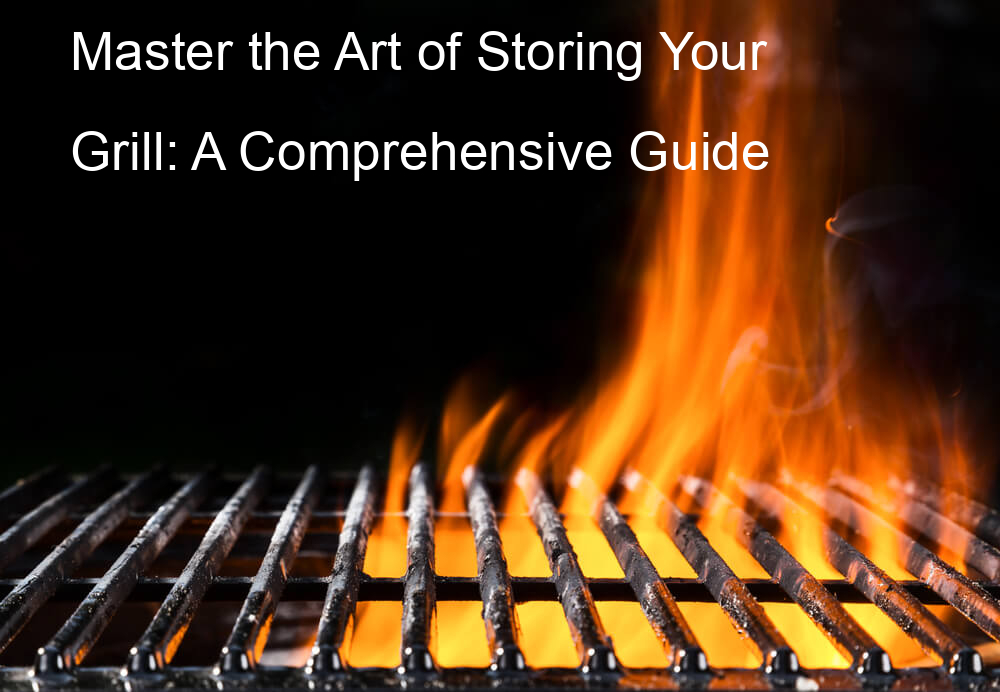Introduction to Grill Storage
Grill storage is an essential part of owning a grill. It’s not just about keeping your grill clean and ready for your next barbecue. It’s also about prolonging its lifespan and ensuring it performs at its best every time you use it. In this section, we will discuss the importance of proper grill storage and some common mistakes to avoid.
- Importance of proper grill storage
- Common mistakes in grill storage
Proper grill storage is crucial for several reasons. Firstly, it protects your grill from the elements, which can cause rust and deterioration. Secondly, it keeps your grill clean and free from dust and insects, ensuring that your food tastes its best. Lastly, it helps to maintain the performance of your grill, so you can enjoy delicious barbecues for years to come.
There are several common mistakes that grill owners make when it comes to storage. These include not cleaning the grill before storing it, leaving it exposed to the elements, and not using a grill cover. These mistakes can lead to rust, damage, and a decrease in grill performance. In the following sections, we will provide tips on how to avoid these mistakes and store your grill properly.
Understanding the importance of proper grill storage and the common mistakes to avoid is the first step towards prolonging the life of your grill. In the next sections, we will provide practical tips and step-by-step guides on how to store your grill correctly.
Grill Storage Tips
Proper storage of your grill can significantly extend its lifespan and maintain its performance. Here are some crucial tips for outdoor grill storage:
Outdoor Grill Storage
Storing your grill outdoors requires careful consideration. Let’s delve into the key aspects:
- Choosing the right location
- Protecting your grill from weather elements
- BBQ grill storage solutions
Choosing the right location for your grill is essential. It should be in a place that is not directly exposed to sunlight, rain, or snow. A shaded area, such as under a patio or a gazebo, is ideal. This will protect your grill from harsh weather conditions and prolong its life. If you don’t have a shaded area, consider investing in a grill gazebo.
Protecting your grill from the elements is crucial. A high-quality grill cover is a must-have. It should be waterproof and UV-resistant to protect your grill from rain and sun damage. Additionally, make sure to clean and dry your grill before covering it to prevent rust and mold growth.
There are various BBQ grill storage solutions available. Grill cabinets and shelves can provide ample space to store your grilling tools and accessories. Grill carts with wheels can also be a convenient option, allowing you to easily move your grill around. Additionally, grill tool hooks can keep your grilling utensils organized and within reach.
Remember, proper grill storage can save you from costly repairs or replacements. So, take the time to choose the right location, protect your grill from weather elements, and explore various BBQ grill storage solutions.
Indoor Grill Storage
Storing your grill indoors requires careful preparation and safety measures. Here’s how you can do it effectively:
- Preparation for Indoor Storage
- Safety Measures for Indoor Grill Storage
Before storing your grill indoors, ensure it is thoroughly cleaned. Remove any food residue or grease, as these can attract pests and cause unpleasant odors. Disconnect the propane tank if you have a gas grill, as it should never be stored indoors. If your grill is electric, make sure it’s unplugged. Cover your grill with a suitable cover to protect it from dust and scratches.
Safety is paramount when storing a grill indoors. Never store a propane tank inside your home, garage, or shed. It can leak and cause a fire or explosion. Always store it outside, in a well-ventilated area. Keep your grill in a dry place to prevent rusting. Ensure the grill is out of reach of children and pets, and not blocking any exits or pathways. Regularly check the grill for any signs of damage or rust.
Indoor grill storage can be a great way to extend the life of your grill and keep it in top condition. Just remember to follow these tips and always prioritize safety.
How to Store a Grill: Step by Step Guide
Storing your grill properly is essential to maintaining its longevity and performance. Here’s a simple, step-by-step guide to help you store your grill safely and effectively.
-
Cleaning the Grill
Before storing your grill, it’s important to give it a thorough cleaning. This not only helps to maintain the grill’s condition, but also prevents the build-up of grease and food particles which can attract pests.
Start by removing the grates and giving them a good scrub with a grill brush. Use a mild detergent and warm water to clean the exterior of the grill. Make sure to dry all parts thoroughly to prevent rusting. Here is a detailed guide on how to clean a grill.
-
Disassembling the Grill
Once the grill is clean, you can begin disassembling it for storage. Start by removing the propane tank, if your grill uses one. Then, carefully remove any other detachable parts such as the grates, burners, and drip trays. Be sure to consult your grill’s manual for specific instructions on disassembly.
-
Properly Packing and Storing the Grill
When packing your grill for storage, wrap each part separately in bubble wrap or a thick cloth to prevent scratches and damage. Store the grill in a dry, cool place away from direct sunlight. If possible, cover the grill with a grill cover for added protection. Remember to store the propane tank separately, in a well-ventilated area away from heat sources.
By following these steps, you can ensure that your grill remains in top condition during storage, ready for your next barbecue session. Remember, proper care and maintenance can significantly extend the lifespan of your grill.
Grill Maintenance
Keeping your grill in prime condition is essential for its longevity and performance. Let’s delve into the importance of regular grill maintenance and how it aids in grill storage.
Regular Grill Maintenance
Regular maintenance of your grill is not just about keeping it clean and shiny. It’s about ensuring that it performs at its best and lasts for many grilling seasons to come. Let’s explore this in more detail.
- Importance of Regular Grill Maintenance
- How Regular Maintenance Aids in Grill Storage
Regular grill maintenance is crucial for several reasons. First, it helps to maintain the grill’s performance. A clean grill heats up faster, cooks food more evenly, and prevents flare-ups. Second, it prolongs the lifespan of the grill. Regular cleaning prevents rust and corrosion, which can cause significant damage over time. Lastly, it enhances food safety. A clean grill reduces the risk of foodborne illnesses caused by bacteria and other pathogens that can accumulate on the grates.
Regular maintenance plays a significant role in grill storage. A well-maintained grill is easier to store because it’s less likely to have grease or food particles that can attract pests. Additionally, regular cleaning and maintenance can prevent rusting during storage, especially in humid conditions. It’s also easier to cover and protect a clean grill, which is essential for outdoor storage. In essence, a well-maintained grill is a well-stored grill.
Seasonal Grill Maintenance
Just like any other appliance, your grill requires seasonal maintenance to keep it in top shape. Let’s dive into the steps you should take to prepare your grill for different seasons.
- Preparing your grill for the winter
- Winter grill storage tips
- Getting your grill ready for the grilling season
Winter can be harsh on your grill. To protect it, start by cleaning it thoroughly. Remove any food particles and grease that might have accumulated. Then, disconnect the propane tank and store it in a safe place. If your grill is electric, unplug it and ensure it’s dry to prevent electrical issues. Finally, cover your grill with a heavy-duty grill cover to protect it from the elements. Learn more about grill maintenance here.
Storing your grill properly during winter can extend its lifespan. Choose a cool, dry place to store your grill. If you must leave it outdoors, ensure it’s covered and elevated off the ground to avoid moisture damage. Regularly check on your grill throughout the winter to ensure the cover is secure and there’s no visible damage.
As the grilling season approaches, it’s time to get your grill ready. Start by inspecting it for any damage. Then, reconnect the propane tank or plug it back in if it’s electric. Clean the grates thoroughly and test the grill to ensure it’s working properly. If you notice any issues, it might be time for a professional check-up.
Remember, regular maintenance is key to keeping your grill in good shape and extending its lifespan. Happy grilling!
Protecting Your Grill
One of the most important aspects of grill ownership is ensuring that your grill is well-protected. This not only helps to extend its lifespan but also improves its performance. Here, we will discuss two key strategies for protecting your grill: using grill covers and regular grill inspections.
- Using Grill Covers for Protection
- Benefits of Regular Grill Inspections
Grill covers are a simple and effective way to protect your grill from the elements. They shield your grill from rain, snow, dust, and even the harsh rays of the sun. This helps to prevent rusting and other forms of wear and tear. A good quality grill cover is made from durable material and fits your grill perfectly. It’s a small investment that can significantly extend the life of your grill. For more information about grill covers, you can visit Wikipedia.
Regular grill inspections are another crucial part of grill protection. These inspections allow you to spot any potential issues before they become major problems. For instance, you might notice that a part is wearing out and needs to be replaced, or that the grill isn’t heating evenly. By catching these issues early, you can fix them promptly and prevent further damage. Regular inspections also ensure that your grill is always ready to use when you need it. In the long run, this can save you time, money, and frustration.
In conclusion, protecting your grill is all about proactive care. By using a grill cover and conducting regular inspections, you can keep your grill in top shape for many years to come. Remember, a well-cared-for grill is a happy grill!
Case Studies: Grill Storage Solutions
Let’s delve into some real-life examples of successful grill storage solutions. These case studies will provide you with practical insights and ideas for your own grill storage needs.
- Case study 1: Successful Outdoor Grill Storage
- Case study 2: Effective Indoor Grill Storage
Meet John, a grill enthusiast from Texas. John loves to grill outdoors, but the unpredictable weather conditions were a constant threat to his beloved grill. He decided to invest in a high-quality, waterproof grill cover from callthegrillman.com. The cover not only protected his grill from rain and snow but also from dust and UV rays. John also made sure to clean and dry his grill before covering it, which helped prevent rusting and damage. Today, his grill is in excellent condition despite being stored outdoors.
Susan, a grill fan from New York, faced a different challenge. She lived in an apartment with limited outdoor space, so she had to store her grill indoors. She chose a compact, foldable grill from callthegrillman.com that could easily fit in her storage closet. Susan made sure to clean her grill thoroughly after each use and let it cool down completely before storing it. She also placed a tray under the grill to catch any residual grease or ashes. This effective indoor storage solution has kept her grill in top-notch condition and ready for use at any time.
These case studies demonstrate that with the right approach and resources, you can successfully store your grill either outdoors or indoors. The key is to understand your specific needs and circumstances and choose a storage solution that works best for you.
Conclusion: Mastering the Art of Grill Storage
As we wrap up our comprehensive guide on grill storage, it’s essential to remember that proper storage and maintenance of your grill can significantly extend its lifespan and ensure optimal performance. Let’s recap the key takeaways and provide some final tips for successful grill storage.
- Key takeaways
- Proper grill storage starts with thorough cleaning. Remove all food debris and grease to prevent corrosion and pests.
- Invest in a high-quality grill cover. It will protect your grill from the elements and prolong its life.
- Store your grill in a dry, well-ventilated area to prevent moisture build-up and rust.
- Regular maintenance, including checking for rust and replacing worn-out parts, is crucial for keeping your grill in top shape.
- Final tips for successful grill storage
- Always follow the manufacturer’s instructions for cleaning and storing your specific grill model.
- Consider using a desiccant to absorb any excess moisture in the storage area.
- Don’t forget to periodically check on your stored grill, especially during the off-season, to ensure it remains in good condition.
- Remember that proper grill storage is an investment in the longevity and performance of your grill. It’s worth the time and effort!
Throughout this guide, we’ve covered various aspects of grill storage. Here are the key points to remember:
As you embark on your journey to master the art of grill storage, here are some final tips to keep in mind:
In conclusion, mastering the art of grill storage is not as daunting as it may seem. With the right knowledge, tools, and a little bit of effort, you can ensure your grill stays in top shape for many grilling seasons to come. Happy grilling!






